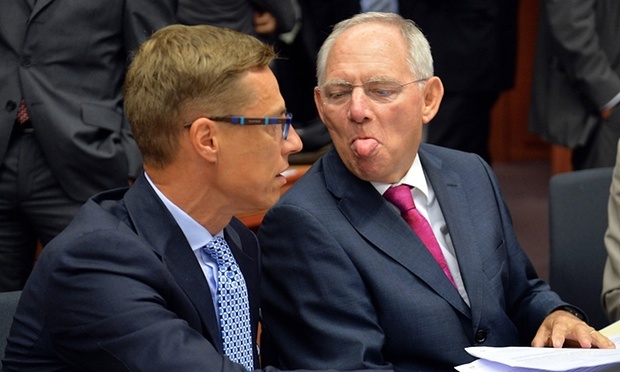http://europeanul.org/wp-content/uploads/2014/02/Wolfgang-Schaeuble.jpg
This is a reminder that Wolfgang Schäuble, Germany’s Federal Minister of Finance, was once ousted for corruption. Read a Newsweek article on the matter from 2000 below.
In the north wing of Berlin’s Reichstag, Germany’s despairing Christian Democrats huddled in a smoky third-floor conference room. After weeks of scandal, plummeting approval ratings and even a suicide, more than 100 CDU parliamentarians were locked in a bitter argument about the future of their party. Finally a group of renegade deputies from North Rhine-Westphalia, Germany’s most populous state, decided the moment was right for a mutiny. In a tense exchange with the party’s embattled chairman, Wolfgang Schauble, they demanded early elections for a new leadership. By the end of the day, Schauble had become the latest casualty in the corruption scandal tearing apart the country’s conservative opposition. “We cannot go on like this,” he conceded to fellow parliamentarians before announcing his resignation at a hastily called news conference. “We need a new beginning.”
They sure do. Schauble’s ouster last Wednesday was the second shock to convulse the Christian Democratic Union in as many days. Just 24 hours earlier, Bundestag President Wolfgang Thierse had hit the party with a 21 million fine–the highest against a political party in German history–for illicit campaign financing, a massive sum that threatens the CDU with bankruptcy. Since the “Spendenaffre” broke last November, party officials have had to admit that former chancellor Helmut Kohl and his associates ran a labyrinthine network of secret slush funds fed by millions of Deutsche marks in undeclared–and therefore illegal–campaign contributions. Parliament is investigating whether the money influenced key government decisions, including the sale of tank parts to Saudi Arabia and an east German oil refinery to the French firm Elf Aquitaine. Kohl faces years of inquiries and possible criminal prosecution. As public prosecutors began bearing down on the party’s records last month, one Treasury official hanged himself in his Berlin apartment. Top CDU leaders across Germany have been forced to resign, and recent polls show that the party’s approval rating has dropped to just 26 percent.
With Schauble’s resignation, the CDU loses one of its brightest leaders. A career politician who was Kohl’s protege and his personally anointed successor as CDU chairman, he was widely expected to challenge Gerhard Schroder for the chancellorship in 2002. The Freiburg-born lawyer rose quickly through party ranks, thanks to a talent for soaring rhetoric and his unquestioning loyalty to Kohl. It was Schauble, then Interior minister, who negotiated the country’s reunification in 1990. A failed assassination attempt that year left him paralyzed from the waist down, but he was back at his desk in Bonn just weeks after the shooting. Eight years later, with Kohl’s popularity sinking, Schauble’s name was circulated as a stronger candidate for chancellor. But Schauble, ever the loyalist, threw his support behind Kohl–who was defeated after 16 years in power.
In the end, that allegiance was Schauble’s undoing. As a member of Kohl’s inner circle, he was immediately tainted last November when prosecutors and German press reports first revealed that the former chancellor personally ran the slush-fund system during his 25 years as party chairman. Schauble then compounded the damage. At first the chairman insisted that he had only briefly met Karlheinz Schreiber, the fugitive weapons dealer who regularly handed bags of cash to CDU officials. Then last month Schauble was forced to admit that he had personally accepted a 100,000 Deutsche mark donation from Schreiber–in cash. He also admitted that he had, in fact, met Schreiber several more times. “To get past this crisis, the only logical choice was for Schauble to go,” one senior CDU deputy told NEWSWEEK.
Now the party–and the country–are pondering what comes next. Schauble’s exit will enable a younger group of CDU politicians to grab the party’s reins. They include Friedrich Merz, 44, a budget and finance expert from North Rhine-Westphalia named late last week to succeed Schauble as the Christian Democrats’ leader in Parliament. Still, the scandal is far from over: Kohl remains mum, claiming he gave his “word of honor” to keep his donors anonymous. The parliamentary investigators have just begun their work and last week reported that reams of documents relating to the Elf Aquitaine deal have disappeared. The party membership is demoralized, and upcoming elections in two key states are all but lost. “After the last few weeks’ revelations, the scandal has now reached dimensions that no one could have imagined,” says Manfred Gollner, director of the Forsa polling institute in Berlin. “It’s now possible for the party to break apart.” If that happens, he warns, many Germans who now vote CDU could rally behind right-wing xenophobic splinter groups resembling Jorg Haider’s Freedom Party in Austria. That would make the Spendenaffre not just a Christian Democratic problem, but one for all of Germany.
